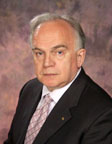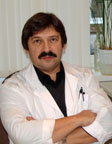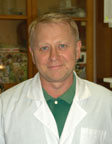Immunological Mechanisms of Regulation of Micro and Macroorganisms’ Interaction
Basic Division: Department of Microbiology and Immunology
Brief Description of Research Activities
The key postulates of immunophysiology as a new scientific trend are being formulated and validated. Immunophysiology recognizes the immune system, along with nervous and endocrine ones, as a regulator of physiological functions in the normal state and during the body adaptation to extreme factors.
The change in the functional state of the immune system individual components under the influence of factors, which do not lead to antigenic shifts, is being investigated.
The dependence links between mast cells and thromobocytosis, labrocytes and eosinophil growth are being discovered. The role of mast cells (heparin, histamine, glycosaminoglycans) in the regulation of the body adaptive reactions is being investigated.
The principles of immune correction under various immune deficiency states caused by different pathological processes, including inflammatory, autoimmune and oncological ones, are being developed in the experiment and in clinic conditions.
New highly-efficient bioactive compounds of microbial and synthetic origin are being searched for to include in complex therapy.
Molecular-cell mechanisms of neuroendocrine regulation of immune system functions are being investigated.
There is a study being conducted on endocrine regulation processes of differentiation and functioning of immune system cells, as well as molecular mechanisms of immunoregulatory activity of protein/peptide and steroid reproduction hormones and immunomodulators.
A research into the processes of extra-thymic differentiation of T-lymphocytes during the pregnancy is going on.
Contemporary methods of non-instrumental diagnostics on the basis of unique technologies providing the solution of a problem of reliable surface functioning of the nano-sized particles are being developed.
Reagents to construct a wide range of analytical and diagnostic test-systems, which do not require hardware for their realization, are being produced. The application field of such test-systems includes hospital and community testing, emergency situations in the work of ambulance, Ministry of Emergency Situations groups, military divisions, epidemic situations, field (also veterinary) cases.
There is an ongoing development of methods and technologies for recovery and modification of structure of biological macromolecules including bioactive compounds from various environments.
The integrated scientific results of two trends for a five-year period (2005-2009) have been published in six monographs, three manuals and one course book, in three scientific publications, 45 articles of the Higher Attestation Commission and included into lecture courses.
Selected Publications Characterising Scientific Research Trend
1. Social demographic safety of Russia / Ed. by members of Russian Academy of Sciences and Russian Academy of Natural Sciences V.A. Chereshnev and A.I. Tatarkin; Institute of Economics of the Ural Branch of the Russian Academy of Sciences. Yekaterinburg, 2008. 632 p. (In Russian)
2. Grigoyev A.I., Chereshnev V.A., Agadjanyan N.A. et al. Human ecology: course book. M.: GEOTAR-Media. 2008. 240 p. (In Russian)
3. Human ecology in a changing world / Collective research. Ed. by V.A. Chereshnev. 2nd edition, revised. Yekaterinburg: Ural Branch of the Russian Academy of Sciences Publication, 2008. 570 p. (In Russian)
4. Rayev M.B. Universal tools for non-instrumental analytics on the basis of carbon particles // Herald of the Ural Medical Academic Science. 2009. № 2/1 (24). P. 333 – 334. (In Russian)
5. Shirshev S.A. cAMP-dependent mechanisms of endocrine control of immune system during pregnancy // Biology Bulletin Reviews. 2010. Vol. 130, № 2. P. 130-146. (In Russian)
6. Chereshnev V.A., Gein S.V., Baeva T.A. et al. Modulation of cytokine secretion and oxidative metabolism of innate immunity effectors under the effect of Rhodococcus biosurfactant // Bulletin of Experimental Biology and Medicime. – 2010. – No. 6. – P. 673-677. (In Russian)
7. Chereshnev V.A., Shilov Ju. I., Chereshneva M.V. et al. Changes in immune system functioning and their correction with myelopeptides under penetrating eye injury // Russian Immunological Journal. – 2010. – Vol. 4 (13), No. 3. – P. 225-236. (In Russian)
8. Experimental models for pathological states: course book / Chereshnev V.A., Shilov Ju. I., Chereshneva M.V., Samodelkin E.I., Gavrilova T.V., Gusev E. Ju., Gulyaeva I.L. Perm State University.- Perm, 2011. – 267 p. (In Russian)
Most Significant Fundamental Research Projects within Scientific Research Trend
1. Federal target programme “Research and development in the priority fields of scientific and technological complex of Russia for 2007-2012”. Priority field “Living systems”. Lot 1. Problem-oriented search for investigations and providing a scientific and technological basis in the sphere of living systems in critical technology “Biocatalytic, biosynthetic and biosensor technologies” (Programme arrangement). Scientific leader: prof. I.B. Ivshina, 2007-2012.
2. Russian Academy of Sciences Presidium Programme of Fundamental Investigation “Biological diversity”. Scientific leader: prof. V.A.Chereshnev, 2009-2010.
3. Russian Academy of Sciences Presidium Programme “Molecular and cell biology”, “Study of molecular mechanisms of immunomodulating activity of reproduction hormones”. Scientific leader: prof. S.V. Shirshev, 2009-2011.
4. Russian Foundation for Basic Research Grant 10-04-06067 for organising and hosting of All-Russian conference “Reproduction immunology”, scientific leader: prof. S.V. Shirshev, 2010.
5. Federal Target Research and Development Programme “Research and development in priority fields of science and technology for 2002-2006”. New biocatalysts of microbe origin as a basis for producing promising medical products (project No. RI-112/001/376, state contract of 05.09.2005 No. 02.445.11.7190). Scientific leaders: active member of the Russian Academy of Sciences, prof. V.A. Chereshnev, corresponding member of the Russian Academy of Sciences, prof. I.B. Ivshina, 2002-2006.
6. Federal Target Research and Development Programme “Research and development in priority fields of science and technology for 2002-2006” - "Living systems" - 1.12: “Developing the system of leading schools of thought as a basis for generating knowledge and training scientific and pedagogical specialists of higher qualification”. New preparations of bioactive substances of microbial origin as a basis for producing promising medicinal agents. State contract with the Federal Agency for science and innovations 02.120.11.1103 of 09.06.2007. Code ST. Scientific leader: active member of the Russian Academy of Sciences, prof. V.A. Chereshnev, 2002-2006.
Most Significant Applied Projects within Scientific Research Trend, Including Enterprise Orders
1. Russian Foundation for Basic Research Grant – Ural, 04-04-96064-р2004ural_a “Research into extra-thymic differentiation of ab T-lymphocytes during pregnancy”, scientific leader: prof. S.V. Shirshev, 2004-2005.
2. Russian Foundation for Basic Research Grant, 2007-2008 “Construction of universal high-stable reagent on the basis on carbon nanoparticles to detect immunological reactions”, scientific leader: prof. M.B. Rayev, 2007-2008.
3. Russian Foundation for Basic Research Grant 10-04-06067 for organizing and hosting of All-Russian conference “Reproduction immunology”, scientific leader: prof. S.V. Shirshev, 2010.
4. Russian Academy of Sciences Presidium Programme “Molecular and cell biology”, “Study of molecular mechanisms of immunomodulating activity of reproduction hormones”. Scientific leader: prof. S.V. Shirshev, 2009-2011.
5. Federal Target Research and Development Programme “Research and development in priority fields of science and technology for 2010”. “Developing the system of leading schools of thought as a basis for generating knowledge and training scientific and pedagogical specialists of higher qualification”, scientific leader: prof. V.A. Chereshnev, prof. I.B. Ivshina, 2010.
Training of researchers (Post-graduate and Doctoral Programmes)
Post-graduate Studies in speciality “Immunology”.
International Scientific and Educational Activities within Scientific Research Trend
Joint research according to the active contracts in scientific cooperation. Hosting foreign scientists to discuss the results of work and its prospects.






